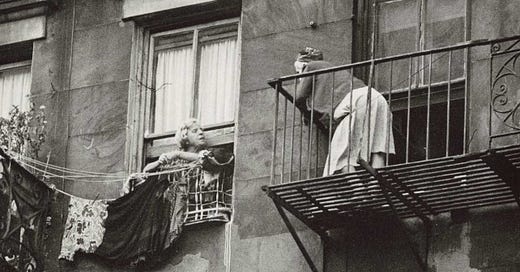
The Free Press

The news lately has not exactly been a walk in the park. Iran launched hundreds of rockets at Israel, creating the prospect of World War III; we have Trump’s ongoing criminal trial; a TikTok ban; a war in Ukraine; and much of the Ivy League is now co-opted by Hamas. Should we go on?
Sometimes, we just need a breath of fresh air. Cue the one and only David Sedaris—America’s favorite humorist, or at the very least, our favorite humorist.
You might know David from one of his bestselling books like Me Talk Pretty One Day, Calypso, and Happy-Go-Lucky, which I loved speaking to him about on Honestly. His words are frequently in The New Yorker, and he’s also just come out with a children’s book called Pretty Ugly, which he says has “no message.”
His latest offering for The Free Press is an essay in which he imparts his thoughts on the underappreciated joys of small talk. You can listen to him reading it, or scroll down to read the text. We hope you enjoy.
—BW
The New York apartment building Hugh and I live in isn’t terribly big. I wanted a nice view, so we’re on a high floor, the drawback being that we need to rely on the elevator—not for going down so much, but only my friend Dawn would carry a load of groceries up twenty flights of stairs. The building has doormen, so between me and the street there is definitely one, but more often, two or three occasions for small talk. Nobody likes this kind of thing. That said, there’s a definite art to it.
Not long after we moved in, I was heading to the lobby, and a neighbor I would later get to know as Tommy boarded the elevator one floor below mine. He nodded at me, and as the doors closed I raised a finger. “May I ask you a question?”
“Not if it’s about how much to tip the doormen at Christmas,” he said.
That was exactly what I was going to ask. Quick, I thought, think of a replacement. “Can you recommend a cobbler?” I asked.
Now it is five years later. I’m on my way to the lobby and when a woman boards at 14, I ask, “How long have you known your dentist?”
She thinks for a moment. “Fifteen years. Why?”
“Just curious,” I say. “I knew my old one for almost that long but then we moved to New York and I had to start over.”
“And where did you move here from?” she asks. And then we’re off, pleasantly conversing until we part ways on the ground floor.
How long have you known your dentist is such a good icebreaking question, a real keeper in my opinion. I didn’t make it up, it’s not mine, rather I found it on Duolingo, an app my friend Dave turned me on to. He’d been using it to learn Spanish. Me, I started with Japanese. It offers over forty languages, free with ads, and free of them for a pretty nominal charge.
Each program features the same cast of animated characters: the excitable little boy, the bored teenage girl with hair covering her face. There’s an athletic-looking blond fellow, Vikram, who wears a turban, and Bea, who, according to her profile, is of West African heritage: eleven in all, including a talking bear named Falstaff. Sometimes Duolingo will give me a sentence in English: “How many desks are in the room?” and I have to translate it into Japanese choosing from the menu of words written in hiragana at the bottom of the screen. Other times I have to read a sentence out loud and the characters will either accept or reject me, based upon my pronunciation. My least favorite is when they give me the sentence and I have to write it in whichever language I’m studying. If you’ve only ever learned English you maybe don’t know that in other countries, “I gave her the suitcase,” might go, “I gave to her the suitcase,” or “I had to her the suitcase gave.” You have to grasp a new word order. Then there’s the spelling to worry about.
My friend Mike is learning Yiddish with Duolingo and one of the sentences it taught him is: “My uncle is a broken man.” I used its French program to freshen up before a trip to Paris not long ago, and was both surprised and not by the question, “What is he doing in our bed?”
I’m a dilettante, and always have been. Rather than really buckling down and mastering anything, I flit from one language to the next. Thus I noted how different Duolingo’s Japanese was from Duolingo’s German version. In the latter, the characters have definite opinions. “Your apartment is dark and ugly.” “I don’t like your sweater.”
They give the impression that German people are direct and judgmental, but also outdoorsy, generous, and sure of themselves. Thus such sentences as, “I’m sorry, but your doctor is playing volleyball today,” “I am giving one hundred toilets to my father,” and “Spain needs us.” There’s a lot of talk about witches, but no mention of them dating one another, this as opposed to Duolingo’s Japanese program where seemingly everyone is gay. “Is that your grandmother’s new girlfriend?” is one of the questions I was taught. Suddenly the guy with the headband on had a husband as well as a son. Even the bear was dating another guy.
I often complained about the last Japanese learning program I used, Pimsleur. So much of the talk was, as it is on their German and Polish and Romanian courses, about drinking. “Do you want a beer? Wine? Sake? Whisky? How many bottles? Should we drink at your place or mine? What time should we start drinking? Do you know what Tenaka-san drinks? Does his wife drink too? Have you ever had drinks with his parents?”
Pimsleur taught me a lot of practical things though, like how to make reservations and buy train tickets. “Which track do I leave on? At what time do we arrive? Is it an express train or a super express train?”
When it comes to icebreaker questions though, the type one might ask in an elevator, both Pimsleur and Duolingo pale compared to Teach Yourself Japanese, a book a woman in England sent me a few pages of. It was what her dad used back in the ’50s, and it includes the phrases: “What will become of us if father dies? Grandmother has turned blind. The man with small hands is my friend. I no longer take any pleasure in my work. Shall I kill myself tomorrow?” and “It is only the third bottle from the left which has poison in it.”
What age, I wonder, are these students? If you no longer take pleasure in your work I’m guessing you’ve been at it for a while, yet your grandmother is still alive, and newly blind? And just how small are the friend’s hands? I’m thinking of someone with the equivalent of raccoon paws, trying to open a bottle of pills he can kill himself with.
Depressing phrases or practical ones, you’ll never become fluent through an app or a book, no matter how many hours you devote to it. You have to talk to actual people. My friend Scott has tutors in both Japanese and French and is miles ahead of me in terms of conversing and understanding. He does his lessons once a week on Zoom. I suppose I could do the same, but I’m afraid I won’t like the tutor, and won’t know how to put an end to our relationship. It’s the same reason I don’t see a psychiatrist or hire a trainer.
Most of the doormen in my building are from Ecuador and one, Adrian, has, at my request, started speaking to me exclusively in Spanish. I took it in high school, so we didn’t have to start from scratch. The problem is that, because he essentially works for me, he’s not going to be as strict as, say, the French teacher I had in Paris. Not that I’m not progressing. Recently I learned that Adrian calls his mother Gordita, which means little fatty. It’s a nice bit of information to start your day with, though it leaves me wondering, and phrasing the question to myself in Japanese, French, German, and now, tentatively, in Spanish, “What does he call me?”
David Sedaris is the author of many books, most recently Happy-Go-Lucky. Read his last essay for The Free Press, “Punching Down.”
Become a Free Press subscriber today:















My husband's is "who is the most famous person from your high school"
hilarious! I can't stop laughing. And I'm sad to admit that fear of how I might end a bad relationship has dictated far too much of my life too. thanks for this!